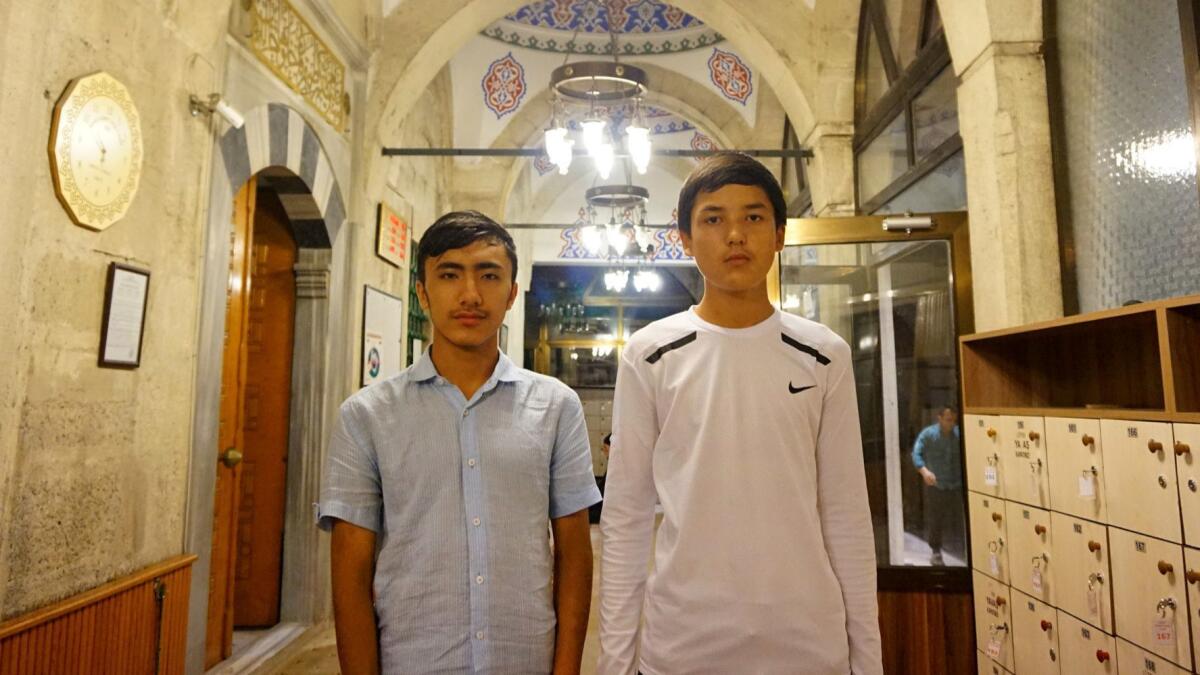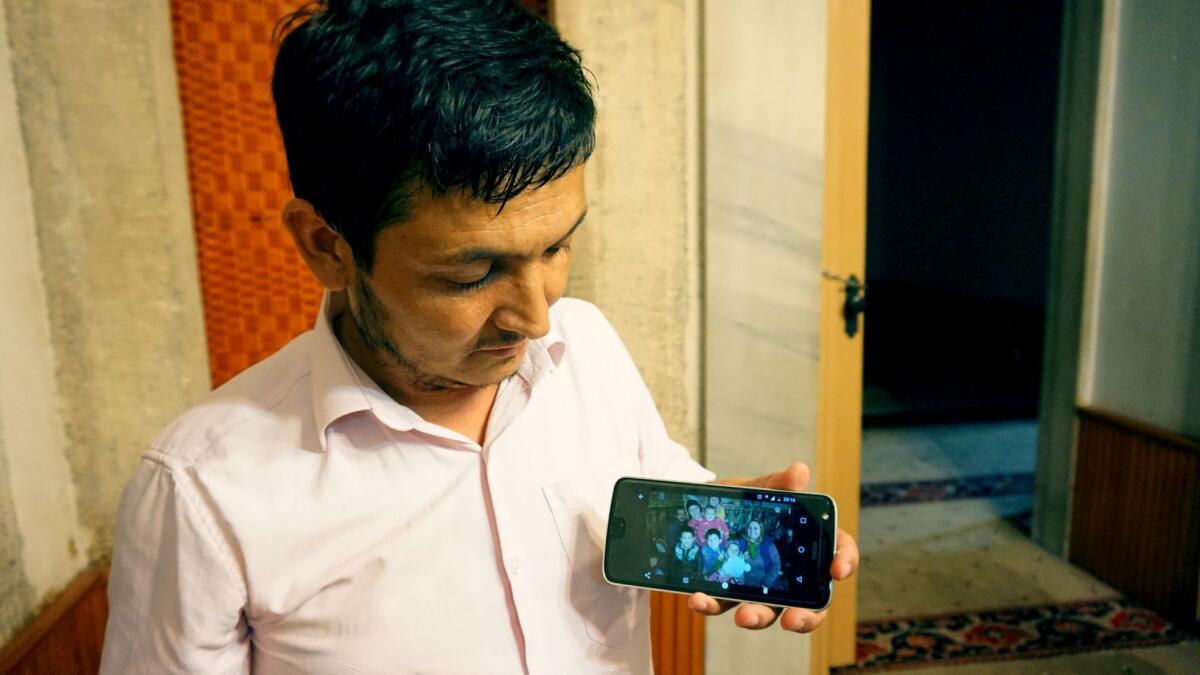Uighurs abroad cut off from relatives in Chinese detention

Reporting from Istanbul, Turkey — Adil Ahmad, 15, has had no contact with his parents since February 2017, when he received a frantic phone call from his mother in the Uighur homeland of China’s western Xinjiang region.
“She said my father was in some kind of trouble with the police,” recalls Ahmad, whose parents had brought him and his older brother to Egypt to study Arabic. “She said, ‘Don’t come back to China.’”
When Ahmad tried calling a few days later, none of the phone numbers worked. Finally, he heard from an uncle in China that his parents had been taken by police after their last phone conversation. His four siblings had also disappeared. Then, his uncle’s phone number stopped working.
Ahmad and his brother, fearing that they would be sent back to China, have since moved to Turkey.
“I really don’t know if my family is alive or dead, or if they are in these camps,” he said.
The youngsters are among tens of thousands of Uighurs living in Turkey who find themselves cut off from their relatives in China. They are left to worry from abroad whether their families have been swept up in a large-scale social engineering campaign aimed at replacing the millennium-old Muslim Uighur identity with a secular Chinese one.
In August, the United Nations Committee on the Elimination of Racial Discrimination estimated that about 1 million Muslims — mostly ethnic Uighurs but also other minorities — in the Xinjiang region were being “held incommunicado … without being charged or tried, under the pretext of countering terrorism and religious extremism.”
Up to 10% of the Uighur population in Xinjiang, the U.N. said, may be in detention.
China has denied Uighurs are being arbitrarily detained, telling the U.N. in August that “there are no such things as reeducation centers,” and that only those suspected of “violent terrorist activities” were being held at facilities providing “vocational education and employment training.”
The Times spoke with 11 ethnic Uighurs living in Turkey who believe their families in China have been placed in reeducation camps. Over the last two years, they have grappled with whether to return to China, as Xinjiang authorities have asked.
Uighurs have long been subjected to intense scrutiny by Beijing, which points to a handful of terrorist attacks as justification for restrictions aimed at stemming the rise of Islamist extremism.
For years, teaching and learning the Uighur language has largely been prohibited. Mosques have been made off-limits to those under 18 and schoolchildren and government workers are banned from fasting during the holy month of Ramadan. Hijabs for women — as well as beards for men — have been outlawed in many parts of Xinjiang.
Yet such practices pale in comparison with policies enacted in 2016, when Beijing reassigned a top Communist Party official, Chen Quanguo, from his job overseeing security in Tibet, according to Adrian Zenz, a researcher at the European School of Culture and Theology in Germany.
In party directives, and bids for construction projects, Zenz has found evidence of a systematic program of building large-scale detention facilities.
At the same time, a pervasive system of surveillance — tapping mobile communications, using facial recognition technology and inspecting phones at hundreds of checkpoints — has made it extremely difficult to obtain details from Xinjiang.
Like Ahmad, Adil Hassan has been unable to reach his family for more than a year. The 35-year-old jewelry trader fled China for Turkey in 2015, after learning he was wanted by police for questioning because of his frequent business trips abroad.
At first, he had only sporadic contact with his wife in China, and in 2016 a friend told him she had been detained.
He has since received video of his three children from a man calling himself a police officer.
“Daddy, I’ve grown up and you never came to see me,” Hassan’s youngest child, Omer, 5, says in one video.

Ismail Abdulkerim, a Uighur language and Islamic studies teacher, came to Turkey with his wife in 2015, after learning they were wanted as a result of their time abroad.
They had left their children in the care of his parents and siblings, but he now believes all his immediate relatives in Xinjiang — including three of his children — are in camps.
“There is oppression in many countries, even war, but not like this: You take away such large numbers of people and no one knows where, or why,” Abdulkerim said.
Among Uighurs outside China, the experience of having relatives in detention centers seems to be “nearly universal,” said Rian Thum, associate professor of history at Loyola University New Orleans.
Aside from some elderly and ill detainees, there is no indication authorities are releasing Uighurs from the camps, Thum said. A vast surveillance network and a blanket ban on Uighurs leaving China have meant even of those released, only a few have provided details of the conditions there.
Among them is Omer Bekali, a 42-year-old ethnic Kazakh Muslim, who spent seven months in police detention centers, and a month in a reeducation camp near Karamay, a city in northern Xinjiang.
Bekali, who ran a small travel company, was born in China but obtained Kazakhstan nationality in 2009. He was released along with 10 other Kazakhstan nationals in November 2017 after the Kazakhstan government intervened on their behalf.
His troubles began during a business trip to China in March 2017, when he took a day off to visit his mother in Turpan. A Uighur in Kazakhstan had warned him to be careful, but Bekali thought he had nothing to worry about.
After being taken by police, he said, he was housed in a 12-square-foot cell with 42 other men.
Shuffled from one detention facility to another, Bekali claims he spent five hours a day suspended from the ceiling by his wrists, which still have scars. Other times, he said, he was beaten with iron and wooden sticks while shackled to a chair.
“They asked me over and over again, do you pray, do you fast, have you been to Turkey, have you been to Syria, are you in a terror group?” Bekali said. “From this I understood they view all Uighur and Kazakh Muslims as terrorists.”
More than seven months after being detained, Bekali was moved to what he believes was one of the reeducation camps. Each day, the detainees were told that their Islamic heritage was backward and that there was no God.
After meals, they were made to line up in two rows and sing patriotic hymns, including one that began, “Without the Communist Party, there is no new China.”
“If you refused, or your voice was not loud enough, you were not given food, or put in solitary, or beaten,” said Bekali. While in the camp, he said, the population swelled by 50 to 60 people daily with truckloads of new detainees brought in at night.
In March, Bekali began speaking to international news outlets about his detention. Within a few weeks, he says, 14 members of his family in China were detained, including his sister, mother and father.
Farooq is a special correspondent.
More to Read
Sign up for Essential California
The most important California stories and recommendations in your inbox every morning.
You may occasionally receive promotional content from the Los Angeles Times.










